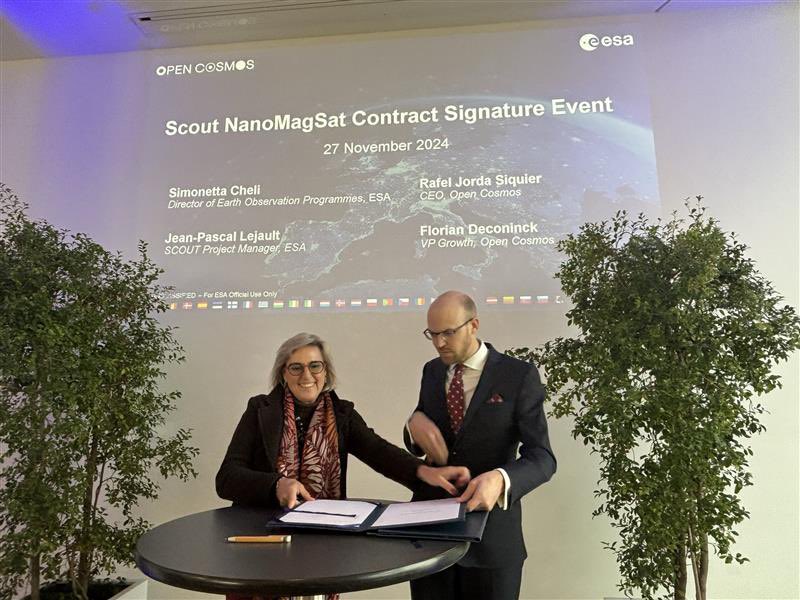
ESA, OpenCosmos sign contract for NanoMagSat mission (Image Credit: Space News)
WASHINGTON — European smallsat developer Open Cosmos has signed a contract with the European Space Agency for a trio of cubesats to study the Earth’s magnetic field and ionosphere.
Officials with ESA and OpenCosmos formally signed the contract to develop the NanoMagSat mission during the ESA Earth Observation Commercialisation Forum Nov. 27. The contract, worth 34.6 million euros ($36.5 million), covers the development, launch and commissioning of the satellites.
ESA selected NanoMagSat along with Tango, a pair of greenhouse gas monitoring satellites, earlier this year as the latest missions in its Scout line of missions in the agency’s Earth Explorer program. Scout missions are intended to cost no more than 35 million euros and launch within three years of kickoff, leveraging commercial development processes.
The three 16U NanoMagSat cubesats will operate in orbits at an altitude of 545 kilometers, two at inclinations of 60 degrees and a third in a polar orbit. Each satellite will have magnetometers on a boom and a Langmuir probe for measuring the Earth’s magnetic field and ionospheric plasmas. The first satellite will launch in late 2027 with the other two to follow in 2028.
ESA selected NanoMagSat as a follow-on to the decade-old Swarm mission, which uses three larger satellites to study the magnetic field. Scientists plan to use the data from NanoMagSat to improve their understanding of the magnetic field and space weather studies.
“NanoMagSat is a great example of the complementarity of small missions to larger ones,” said Florian Deconinck, vice president of growth at Open Cosmos, in a statement. “A small satellite size makes it ideal to minimize electromagnetic noise, and be deployed in constellations for better spatio-temporal coverage, all within the efficient Scout programmatic constraint.”
Open Cosmos is leading a team that includes organizations from Denmark, France, Norway and Spain, who are providing the instruments for the satellites as well as key components like the boom and star trackers.
“NanoMagSat is an exemplary addition to the Scout program, blending innovation, efficiency, and scientific excellence,” said Simonetta Cheli, director of Earth observation programs at ESA, in the statement. “This mission reinforces Europe’s leadership in Earth observation and fosters impactful collaborations across industry and research institutions.”
“This mission demonstrates how small satellites can deliver impactful science, advancing our understanding of Earth’s magnetic field and ionospheric environment,” said Rafel Jorda Siquier, chief executive and founder of Open Cosmos.
The signing of the NanoMagSat contract is the latest in a series of awards for Open Cosmos. The company won a contract in May with 60 million euros to develop a seven-satellite constellation for the Greek government that will provide Earth observation, Internet of Things and Automatic Identification System services. The company is also part of a consortium led by TESAT selected by ESA in October to develop a 16U cubesat to test 6G communications technologies in low Earth orbit.








